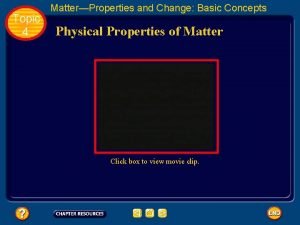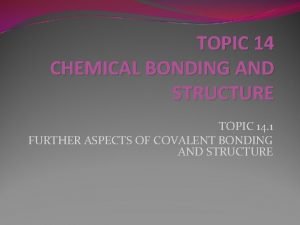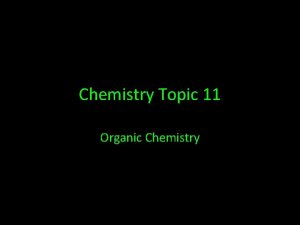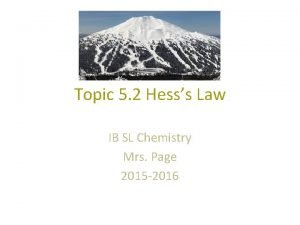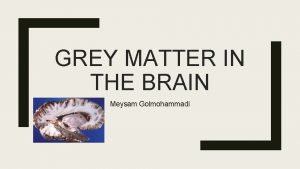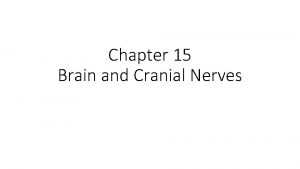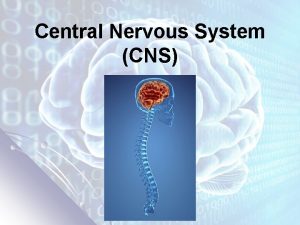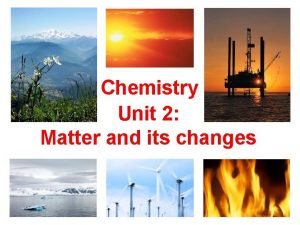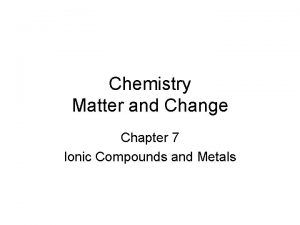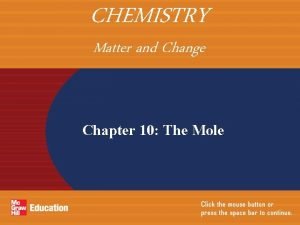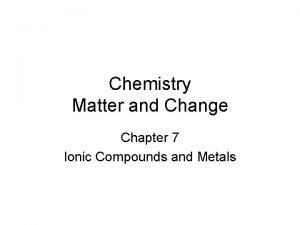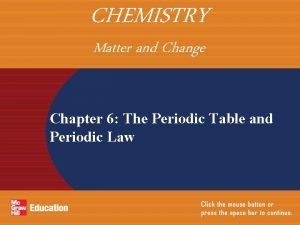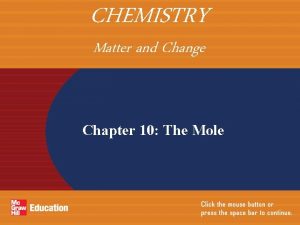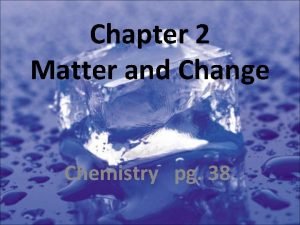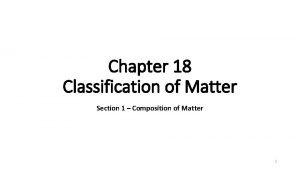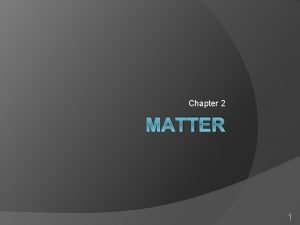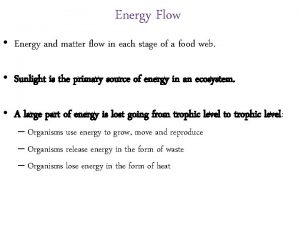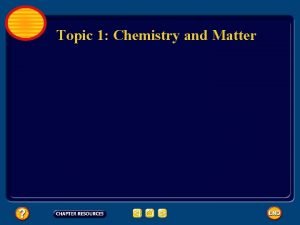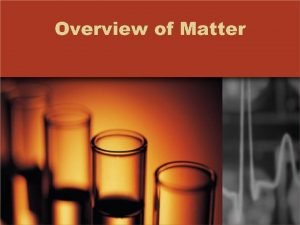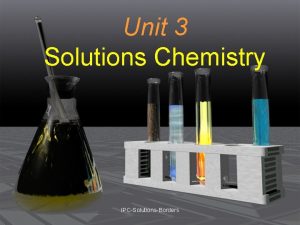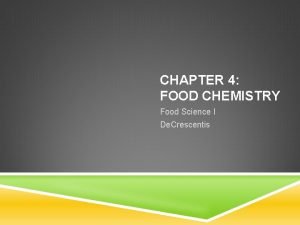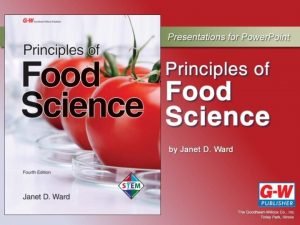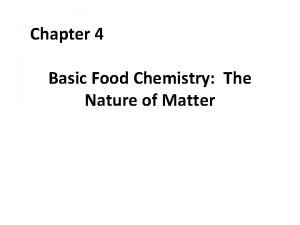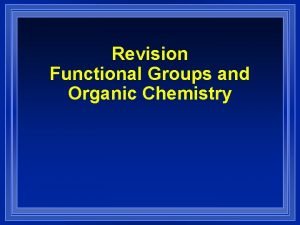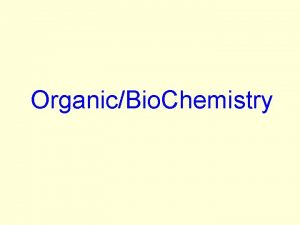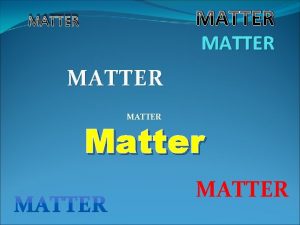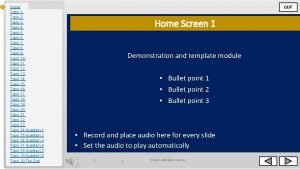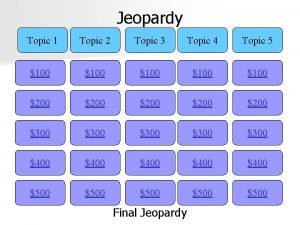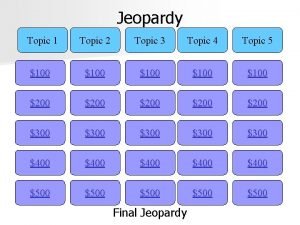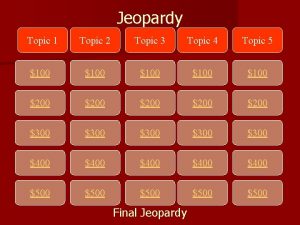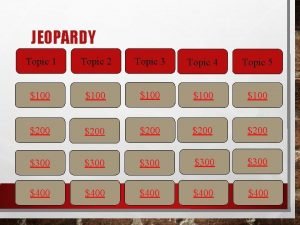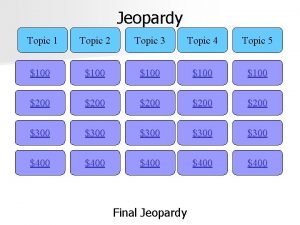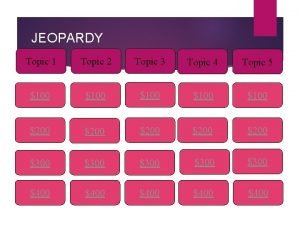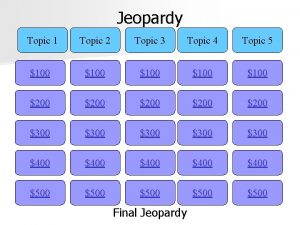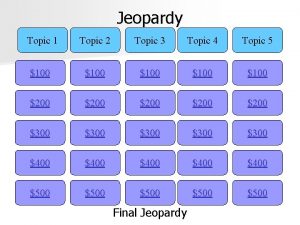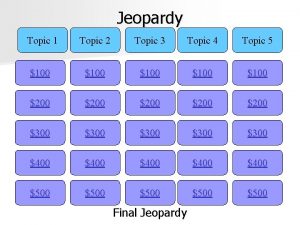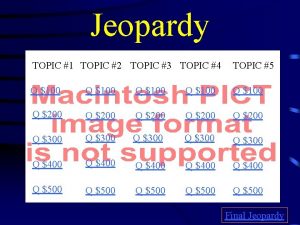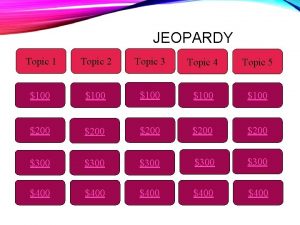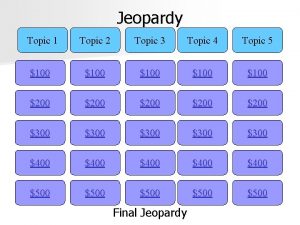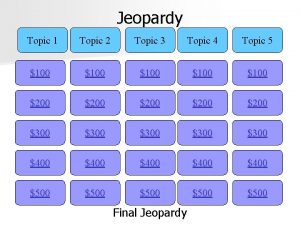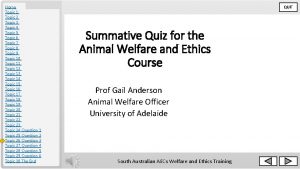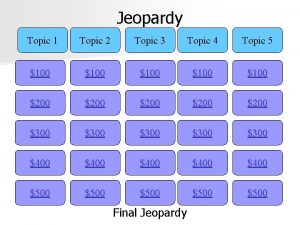Topic 1 Chemistry and Matter Chemistry and Matter































- Slides: 31

Topic 1: Chemistry and Matter

Chemistry and Matter: Basic Concepts Composition, Structure, and Behavior • Chemistry is the science that investigates and explains the structure and properties of matter. • Matter is the stuff that’s all around you: the metal and plastic of a telephone, the paper and ink of a book, the glass and liquid of a bottle of soda, the air you breathe, and the materials that make up your body. • A more formal definition of matter is anything that takes up space and has mass.

Chemistry and Matter: Basic Concepts Composition, Structure, and Behavior • Mass is the measure of the amount of matter that an object contains. • The structure of matter refers to its composition—what matter is made of—as well as how matter is organized. • The properties of matter describe the characteristics and behavior of matter, including the changes that matter undergoes.

Chemistry and Matter: Basic Concepts • • Classification by Composition A powerful way to classify matter is by its composition. This is the broadest type of classification. When you examine an unknown piece of stuff, you first ask, “What is it made of? ” Sucrose is composed of the elements carbon, hydrogen, and oxygen. This is a qualitative expression of composition. A qualitative observation is one that can be made without measurement.

Chemistry and Matter: Basic Concepts Classification by Composition • After a qualitative analysis, the next question that you might ask is how much of each of the elements is present. • For sucrose, the answer to that question is that 100 g of sucrose contains 42. 1 g of carbon, 51. 4 g of oxygen, and 6. 5 g of hydrogen. This is a quantitative expression of composition. • A quantitative observation is one that uses measurement.

Chemistry and Matter: Basic Concepts Pure substance or a mixture? • A sample of matter is either pure—made up of only one kind of matter— or it is a mixture of different kinds of matter. • A pure substance is matter, either an element or compound, with the same fixed composition and properties.

Chemistry and Matter: Basic Concepts Two Types of Substances • One type of pure substance can be broken down into simpler substances. This type of substance is called a compound. • Another type of substance cannot be broken down into simpler substances. Such a substance is called an element. • All the substances of the universe are either elements, compounds formed from elements, or mixtures of elements and compounds.

Chemistry and Matter: Basic Concepts Two Types of Substances • Of the known elements, only about 90 occur naturally on Earth. The remainder are synthesized, usually in barely detectable amounts, in high-energy nuclear experiments. • Less than half of the 90 naturally occurring elements are abundant enough to play a significant role in the chemistry of everyday stuff.

Chemistry and Matter: Basic Concepts Compounds Are More Than One Element • A more complete definition is that a compound is a chemical combination of two or more different elements joined together in a fixed proportion with a unique set of chemical and physical properties. • More than 10 million compounds are known and the number keeps growing.

Chemistry and Matter: Basic Concepts Compounds Are More Than One Element • The properties of the compound are different from the properties of the elements that compose the compound. silver + bromine = silver bromide

Chemistry and Matter: Basic Concepts Pure substance or a mixture? • A mixture is a combination of two or more substances in which the basic identity of each substance is not changed. • Unlike pure substances, mixtures do not have specific compositions.

Chemistry and Matter: Basic Concepts Pure substance or a mixture? • Mixtures are of two types; • A heterogeneous mixture is one with different compositions, depending upon where you look. • The components of the mixture exist as distinct regions, often called phases.

Chemistry and Matter: Basic Concepts Pure substance or a mixture? • Homogeneous mixtures are the same throughout. • Another name for a homogeneous mixture is solution. • Some solutions are gases. Air, for example, is a homogeneous mixture of several gases. • Some solutions are solid. • Liquid solutions do not have to be liquid or contain water.

Chemistry and Matter: Basic Concepts Pure substance or a mixture? • Alloys are solid solutions that contain different metals and sometimes nonmetallic substances.

Separation of Mixtures can be separated into pure substances by various means. • filtration

Separation of Mixtures • distillation

Chemistry and Matter: Basic Concepts States of Matter • Most matter on Earth exists in one of three physical states: solid, liquid, or gas. • Changes in state are examples of physical changes because there is no change in the chemical composition identity of the substance. • Ice can melt back to form liquid water, and steam will condense on a cool surface to form liquid water.

The States of Matter

Topic 1 Chemistry and Matter: Basic Concepts States of Matter • Some substances are described as volatile, which means that they change to a gas easily at room temperature. • Alcohol and gasoline are more volatile than water. • Density is the amount of matter (mass) contained in a unit of volume. • Density is a physical property. • Density= mass/volume

Chemistry and Matter: Basic Concepts States of Matter • Stones have a large density or a large mass per unit of volume. • In science, the density of solids and liquids is usually measured in units of grams (mass) per milliliter (volume) or g/m. L.

Chemistry and Matter: Basic Concepts Pure substance or a mixture? • Physical properties are characteristics that a sample of matter exhibits without any change in its identity.

Chemistry and Matter: Basic Concepts Pure substance or a mixture? • A physical change is a change in matter that does not involve a change in the chemical identity of individual substances. • Examples of physical changes include: • boiling, • evaporating, • freezing, • dissolving, • melting, • and crystallizing.

Chemistry and Matter: Basic Concepts Pure substance or a mixture? • Examples of the physical properties of a chunk of matter include its: • solubility, • melting point, • boiling point, • color, • density, • electrical conductivity, • and physical state (solid, liquid, or gas).

Chemistry and Matter: Basic Concepts Chemical Properties • Chemical properties are those that can be observed only when there is a change in the composition of the substance. • Rusting is a chemical reaction in which iron combines with oxygen to form a new substance, iron oxide. • Inability to react is also a chemical property.

Topic 1 Chemistry and Matter: Basic Concepts Chemical Changes • A chemical property always relates to a chemical change, the change of one or more substances into other substances. • Another term for chemical change is chemical reaction.

Chemistry and Matter: Basic Concepts Chemical Changes • All matter is made of atoms, and any chemical change involves only a rearrangement of the atoms. Atoms do not just appear. Atoms do not just disappear. • This is an example of the law of conservation of mass, which says that in a chemical change, matter is neither created nor destroyed. It would be equally correct to call this the law of conservation of matter.

Basic Assessment Questions Question 1 Identify each of the following as either a compound or a mixture. A. sand B. water C. juice

Basic Assessment Questions Answers A. sand mixture B. water compound C. juice mixture

Basic Assessment Questions Question 2 Classify each of the following as a chemical or physical property. A. density B. reactivity C. color D. melting point

Basic Assessment Questions Answers A. density physical property B. reactivity chemical property C. color physical property D. melting point physical property

Chemistry and Matter: Basic Concepts Pure substance or a mixture?
 General subject example
General subject example Narrowed down topic examples
Narrowed down topic examples Topic 4 physical behavior of matter
Topic 4 physical behavior of matter Topic 14 ib chemistry
Topic 14 ib chemistry Topic 11 organic chemistry
Topic 11 organic chemistry Hess's law ib chemistry
Hess's law ib chemistry Topic 2 chemistry
Topic 2 chemistry Koosha golmohammadi
Koosha golmohammadi Brain falx
Brain falx Gray matter and white matter
Gray matter and white matter Telecephalon
Telecephalon Chemistry matter and its changes
Chemistry matter and its changes Chemistry matter and change chapter 7
Chemistry matter and change chapter 7 Chemistry matter and change chapter 10 the mole answer key
Chemistry matter and change chapter 10 the mole answer key 1s 22 s22 p63 s23 p64 s2
1s 22 s22 p63 s23 p64 s2 Chemistry matter and change chapter 6
Chemistry matter and change chapter 6 Chapter 10 study guide the mole
Chapter 10 study guide the mole 2 matter and change answer key
2 matter and change answer key Section 1 composition of matter
Section 1 composition of matter Classification of matter section 1 composition of matter
Classification of matter section 1 composition of matter Chapter 2 section 1 classifying matter answer key
Chapter 2 section 1 classifying matter answer key Composition of matter section 1
Composition of matter section 1 Flow energy review
Flow energy review Examples of matter in chemistry
Examples of matter in chemistry Classifying matter flow chart
Classifying matter flow chart Flowchart undissolved solids
Flowchart undissolved solids Classification of matter graphic organizer
Classification of matter graphic organizer Non examples of homogeneous mixture
Non examples of homogeneous mixture Chapter 4 basic food chemistry the nature of matter
Chapter 4 basic food chemistry the nature of matter Basic food chemistry the nature of matter
Basic food chemistry the nature of matter Ib organic chemistry
Ib organic chemistry Inorganic chemistry vs organic chemistry
Inorganic chemistry vs organic chemistry


